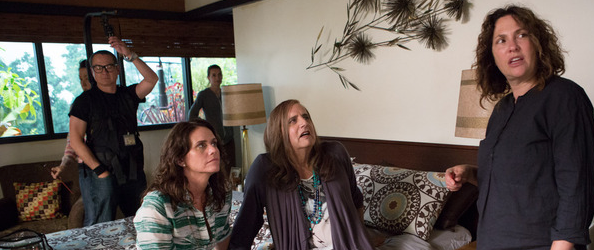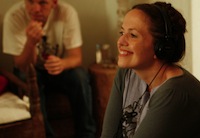When I set out to pursue television shadowing, I got mixed feedback. Some told me that it might not be a good use of my time. I was told that many people end up doing it for years without getting anywhere. I don’t know yet if shadowing will get me hired, but it certainly inspired me. Transparent, tackling family and transgender identity with humor and authenticity, embodies everything that is enticing to me about television right now. More and more television seems to be handling characters and story lines that previously only the most indie of independent films might cover. It’s exciting; audiences and filmmakers alike are taking notice. Jill is a wonderful bridge between the worlds of independent cinema and quality TV, mostly because she walks in both so well. It was a nice break for me to get to watch her do her thing. When I arrived on set, the crew of Transparent was in their last week of filming. They had all been together for months. There was an easy groove and a tight family feeling to the whole shoot. This seemed partially to be the good energy of a crew working on something they feel proud to be a part of, but it was also a tone being set by Jill. When you shadow another director you are a guest in their house. Jill Soloway is a lovely host. She made me feel welcome and went out of her way to make sure I was included. She made room for me by the monitor, set me up with headphones and invited me into her day. I took my cues from her, tried to be present, but not in the way. The first scene of the day was a well-written two-person dialogue scene with a nice quiet rhythm and a bittersweet arc for its characters. I watched as Jill fine tuned performances with two stellar actresses. She moved from broad strokes, nailing the blocking with her cinematographer and two cameras and then made small textural tweaks to her actresses line deliveries. If you go to film school you watch other directors work all the time. It’s a vital part of your education, but once you’re out in the world, it’s rare to get access to other people’s process. The scene clipped along and I was happy to see it take shape. Later things got busier. They were shooting at a cemetery in Altadena. It was a biggish day; Almost the entire cast of the show was there, not to mention a bunch of extras and a few picture cars. The two cameras where joined by a third. Despite the bustle, I was surprised at how similar the shoot felt to the small independent films I’m used to being around. As things got busy, I stayed close to Jill, but also made sure not to get in the way. Shadowing, like directing seems to involve a bit of reading the moment and knowing when to inch in or when to give people room. When Jill huddled for a longer notes sessions with her actors, I stepped back. I talked to the other people on set, met a bunch of the writers, Jill’s assistants, the camera crew. Then when I felt like things were moving again, made my way back to the director. It is hard to pick a single highlight from the day. Maybe it was watching Jill direct her own sister as the singing Cantor Joy. It might have been the way they choreographed a hearse, a limo and twenty extras into a moving frame with Jeffery Tambor’s entrance in the middle. But really it wasn’t a single moment so much as just finding an excited and inspired group of professionals who were welcoming and happy to share? I know the end goal of television shadowing is to find a job. And please don’t get me wrong; I’m definitely looking to get hired. But what I learned shadowing Jill Soloway is that shadowing isn’t just a networking opportunity, it’s a creative gift, a chance to see someone else’s work in action and to learn from that. Mo Perkins / Guest Blogger

